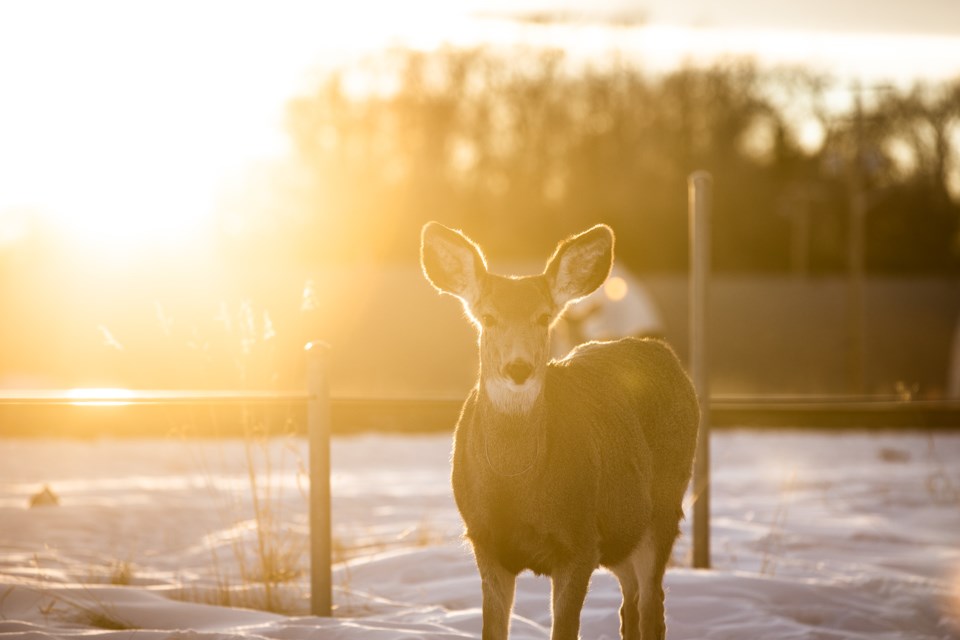After more than a year of consultation and research, a list of recommendations for managing the deer population of Okotoks has come forward.
Town council heard and approved the final report from the Urban Deer Task Force at its May 10 meeting.
Grant Preznyk, chair of the task force, said the committee identified key issues with deer, then deliberated and came up with potential solutions to address those concerns based on biological research and methods used in other municipalities.
“It was really a learning experience for all of us on the task force, I believe,” said Preznyk.
He said the main issues taken into account were what the deer mean to people in Okotoks, as well as what they add to the town; the population of deer and when it fluctuates; habituation of the animals, which are no longer afraid of interactions; and pet injuries.
In addition, he mentioned deer accessing or bedding down on private and public property, residents choosing to feed them, and deer breeding and living within Town boundaries.
“In essence, some of the deer never leave town,” said Preznyk. “They don’t have to leave, there’s everything here for them.”
In response to the concerns and issues raised by residents and observations during deer, the task force members came up with a list of recommended actions.
Short-term solutions include establishing an official urban deer management strategy, expanding public education to help reduce feeding of the animals, allowing for fencing to keep deer out of private yards, and encouraging the use of deer-resistant plants.
More medium-term plans would include maintaining scientific data and investigations, and potential hazing of the deer, he said.
Four mid-terms or long-range options were not recommended by the task force at this time: immunocontraception (sterilization of does), relocation, culling, and establishing a limited hunting season within town limits.
He said the group felt those methods were too intrusive and expensive, and that following the short-term recommendations could help avoid the need for more extensive measures. In addition, they aren’t always effective.
“You remove a bunch of deer, they move back into town again – other new ones come in, or some of the others return again,” said Preznyk.
He said immunocontraception costs $1,200 per animal, and relocation has an even higher price tag due to the use of tranquilizers and costs associated with transport of deer.
“It’s easier to try these other non-intrusive [methods] with the fences and not deliberately feeding, to see if that will make the deer leave,” said Preznyk. “If, after two or three years, that doesn’t work, then I suggest probably the next logical step is to do the immunocontraception.”
The most important recommendation is for the Town to create its urban deer management strategy, which would address the concerns and safety of residents and promote positive interactions with deer, he said.
From there, continuous research must be undertaken to learn whether the population is changing and whether resident opinions or concerns change over time, he said.
Key to the strategy is informing and educating the public.
“It would provide full information on the strategy, what people can do, what the Town is going to do, so everybody knows what’s happening and everybody can do their part to make it happen quickly and better,” said Preznyk.
Minimizing the ability for deer to forage on private property is one of the main ways people can help curb the population, he said.
That could be done with the Town finding a permanent solution to the fencing it approved for the 2021 growing season to prevent deer from accessing yards and gardens, as well as bylaws preventing people from deliberately feeding the animals, he said.
“Set a minimum off-ground height for bird feeders, mandatory bird seed and fruit tree clean-up within a certain acceptable manner, like the bylaw for cleaning snow off your sidewalks,” said Preznyk.
People can also plant deer-resistant flora in their yards to prevent the ungulates from feeding on their properties, he said, adding the Town could implement a rebate program to encourage purchase of those plants.
One of the more active methods included in the recommendations was hazing. This would have to be done in the medium to long-term and would involve permits from Alberta Environment and Parks and the planning of organized events, he said.
“It may be a very organized drive where several people go out and chase deer out of a certain area and drive them right out of town,” said Preznyk. “They are persistent and they like to come back, so it may have to be done more than once.”
No matter which options are chosen, implementation of the recommendations comes at an annual cost, said Preznyk.
In its first year, he said the task force suggested $25,000 to cover the cost of contractors to conduct studies over a three-to-five year period, as well as resources for public education and time to implement some of the strategies.
“Another budget of $20,000 each subsequent year for ongoing studies and resources, because every year data is going to have to be analyzed and compared, and it takes money to do that,” said Preznyk.
CAO Elaine Vincent said the report from the task force is a vision document, and council will not consider the proposed expenses until budget deliberations Nov. 17-19, after Town staff have had the chance to review the recommendations.
“What administration does now is we put it through our budget guideline lens, our organizational design lens, who should deliver, what should it cost, and the timing and phasing,” said Vincent.




